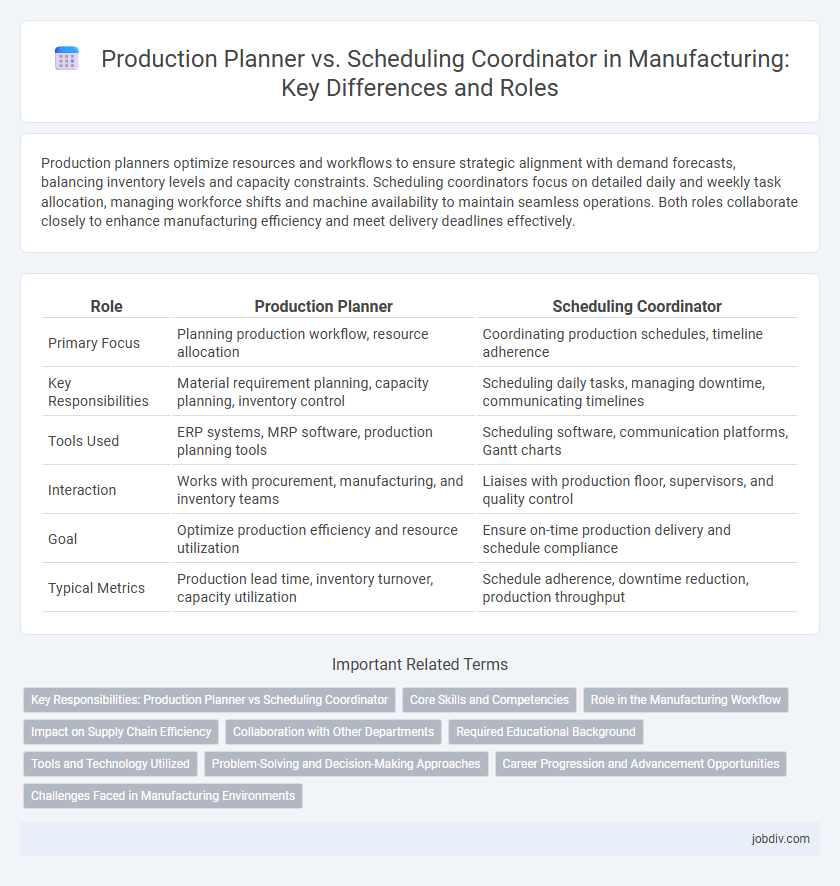Production planners optimize resources and workflows to ensure strategic alignment with demand forecasts, balancing inventory levels and capacity constraints. Scheduling coordinators focus on detailed daily and weekly task allocation, managing workforce shifts and machine availability to maintain seamless operations. Both roles collaborate closely to enhance manufacturing efficiency and meet delivery deadlines effectively.
Table of Comparison
| Role | Production Planner | Scheduling Coordinator |
|---|---|---|
| Primary Focus | Planning production workflow, resource allocation | Coordinating production schedules, timeline adherence |
| Key Responsibilities | Material requirement planning, capacity planning, inventory control | Scheduling daily tasks, managing downtime, communicating timelines |
| Tools Used | ERP systems, MRP software, production planning tools | Scheduling software, communication platforms, Gantt charts |
| Interaction | Works with procurement, manufacturing, and inventory teams | Liaises with production floor, supervisors, and quality control |
| Goal | Optimize production efficiency and resource utilization | Ensure on-time production delivery and schedule compliance |
| Typical Metrics | Production lead time, inventory turnover, capacity utilization | Schedule adherence, downtime reduction, production throughput |
Key Responsibilities: Production Planner vs Scheduling Coordinator
Production Planners develop detailed production plans by analyzing demand forecasts, raw material availability, and production capacity to optimize manufacturing workflows. Scheduling Coordinators allocate specific time slots for production activities, coordinate machine and labor schedules, and monitor real-time progress to ensure adherence to deadlines. Both roles aim to maximize efficiency but differ in scope, with Production Planners focusing on strategic planning and Scheduling Coordinators managing daily execution.
Core Skills and Competencies
Production Planners excel in demand forecasting, inventory management, and resource allocation, ensuring materials and personnel align with production targets. Scheduling Coordinators specialize in creating detailed production timelines, coordinating workflows, and adjusting schedules to optimize efficiency and minimize downtime. Both roles require strong analytical skills, proficiency in ERP systems, and effective communication to synchronize manufacturing processes and meet delivery deadlines.
Role in the Manufacturing Workflow
A Production Planner develops comprehensive manufacturing plans by analyzing demand forecasts, resource availability, and material requirements to ensure timely production. A Scheduling Coordinator translates these plans into detailed daily or weekly production schedules, coordinating with shop floor teams to optimize workflow and minimize downtime. Both roles are critical for maintaining efficiency and meeting delivery deadlines within the manufacturing process.
Impact on Supply Chain Efficiency
Production planners optimize resource allocation and forecast demand to ensure materials and labor are available for manufacturing processes, directly reducing lead times and minimizing inventory costs. Scheduling coordinators translate these plans into detailed production timelines, adjusting workflows and machine assignments in real-time to prevent bottlenecks and maintain on-time delivery. Their combined roles enhance supply chain efficiency by synchronizing production capacity with market demand and operational constraints.
Collaboration with Other Departments
Production Planners facilitate cross-departmental collaboration by aligning manufacturing goals with procurement, engineering, and quality control to ensure material availability and product compliance. Scheduling Coordinators work closely with shop floor teams and logistics to sequence tasks and optimize production flow, reducing downtime and meeting delivery deadlines. Effective collaboration between both roles enhances operational efficiency and responsiveness to changing customer demands.
Required Educational Background
A Production Planner typically requires a bachelor's degree in industrial engineering, manufacturing management, or supply chain management to efficiently design production workflows and resource allocation. A Scheduling Coordinator often holds an associate degree or diploma in logistics, operations management, or business administration, focusing on timetable coordination and order sequencing. Both roles demand a strong understanding of manufacturing processes, but the Production Planner's education emphasizes strategic planning while the Scheduling Coordinator's training centers on operational execution.
Tools and Technology Utilized
Production planners primarily utilize advanced Enterprise Resource Planning (ERP) systems such as SAP and Oracle to forecast demand, allocate resources, and manage inventory levels. Scheduling coordinators focus on specialized scheduling software like Microsoft Project or Preactor APS to create, adjust, and monitor detailed production timelines. Both roles increasingly leverage real-time data analytics and IoT-enabled devices to enhance accuracy and responsiveness in manufacturing workflows.
Problem-Solving and Decision-Making Approaches
Production Planners focus on strategic problem-solving by analyzing production capacity, inventory levels, and demand forecasts to develop optimized production plans that minimize costs and meet deadlines. Scheduling Coordinators apply tactical decision-making skills to adjust daily schedules, resolve unexpected disruptions, and allocate resources efficiently to maintain workflow continuity. Both roles use data-driven approaches but differ in scope, with planners emphasizing long-term efficiency and coordinators prioritizing real-time operational adjustments.
Career Progression and Advancement Opportunities
A Production Planner typically oversees the overall manufacturing workflow and inventory management, positioning them for advancement into roles such as Operations Manager or Supply Chain Director due to their strategic planning expertise. Scheduling Coordinators focus on detailed day-to-day job scheduling and resource allocation, providing a pathway toward roles like Production Supervisor or Project Coordinator where tactical execution skills are essential. Career progression for both roles benefits from gaining proficiency in production software systems, Lean manufacturing principles, and cross-functional collaboration within manufacturing environments.
Challenges Faced in Manufacturing Environments
Production planners face challenges in accurately forecasting demand and balancing inventory levels to prevent overproduction or stockouts, affecting overall efficiency. Scheduling coordinators struggle with real-time adjustments to machine availability, labor shifts, and urgent order changes, which can disrupt production flow. Both roles require seamless communication and data integration to minimize delays and optimize resource utilization in complex manufacturing environments.
Production Planner vs Scheduling Coordinator Infographic

 jobdiv.com
jobdiv.com